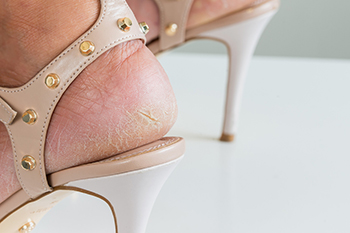
The heels of the feet can become cracked from severe dryness. This can happen from cold, dry weather, walking barefoot, or hot showers. Diabetics can be prone to cracked heels because their illness decreases the natural oils in the feet. Cracked heels can itch, cause pain, and be unsightly. If not tended to, the cracks can turn into fissures, which can bleed and are prone to infection. Tips for preventing and treating this condition include adequate hydration, short baths and showers with water that is not too hot, use of gentle, fragrance-free soaps so feet can retain more of their natural oils, and frequent moisturizing of the feet. Petroleum jelly can be applied to the heels before bed, and socks can be worn to protect bed sheets, as well as to further moisturize the feet. Wearing closed shoes and socks that fit well can help protect against cracked heels. If you have cracked heels that are not responding to home care or if the cracks are worsening or appear infected, it is suggested that you visit a podiatrist for more effective treatment and restoration of the heels to their smooth, healthy state.
If the skin on your feet starts to crack, you may want to see a podiatrist to find treatment. If you have any concerns, contact one of our podiatrists from Pennsylvania. Our doctors can provide the care you need to keep you pain-free and on your feet.
Cracked Heels
It is important to moisturize your cracked heels in order to prevent pain, bleeding, and infection. The reason cracked heels form is because the skin on the foot is too dry to support the immense pressure placed on them. When the foot expands, the dry skin on the foot begins to split.
Ways to Help Heal Them
- Invest in a good foot cream
- Try Using Petroleum Jelly
- Ease up on Soaps
- Drink Plenty of Water
Ways to Prevent Cracked Heels
- Moisturize After Showering
- Skip a Shower
- Keep Shower Water Lukewarm
- Don’t Scrub Your Feet
If you are unsure how to proceed in treating cracked heels, seek guidance from a podiatrist. Your doctor will help you with any questions or information you may need.
If you have any questions, please feel free to contact one of our offices located in Plymouth Meeting and Ambler, PA . We offer the newest diagnostic and treatment technologies for all your foot care needs.
